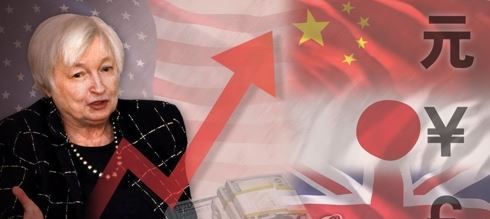Monetary tightening to pose major challenge for S. Korea in 2018: experts
By YonhapPublished : Dec. 25, 2017 - 11:07
South Korea's six major economic institutes on Monday picked the global monetary policy tightening cycle as the biggest challenge for the economy next year.
In Yonhap News Agency's poll of the heads of the country's six economic institutes, they expressed concerns that there might be an outflow of capital from emerging markets as the world's central banks look set to raise rates further as part of monetary tightening.
"A massive amount of capital has been injected into emerging markets due to the US Federal Reserve's monetary easing and record-low rates at global banks," said Hyundai Research Institute Chief Executive Lee Dong-geun.

But the Fed's tightening which began this year by raising rates three times could result in a capital outflow from the same emerging countries, Lee pointed out.
South Korea is less vulnerable to an economic crisis that could result from a massive capital flight due to its solid financial fundamentals compared to other emerging markets, he added.
This year, the Fed raised the cost of borrowing by 0.75 percentage point to a range of between 1.25 percent and 1.50 percent. It is widely expected to raise rates three more times in 2018.
If the Fed raises rates, investors are expected to reorganize their portfolios by converting their financial investments in emerging markets to safer assets.
The institutes checked include such organizations like Korea Institute of Finance Korea (KIF), the Korea Institute for Industrial Economics & Trade (KIET) and the Korea Institute for International Economic Policy (KIEP).
Chiefs of such think tanks also said rising oil prices and North Korea's nuclear weapons development program will pose major challenges for the Korean economy next year.
"There might not be a sharp increase in oil prices as an increased oil production in the United States offsets an extended output reduction by oil majors. But heightened political unrest in the Middle East could increase volatility in oil prices," KIET President Yu Byoung-gyu said.
Geopolitical risks such as escalating North Korean provocations with nuclear ambitions and political tensions between Seoul and Beijing over a US missile defense system in South Korea remain factors which could affect the economy, Yu said. (Yonhap)






![[KH Explains] How should Korea adjust its trade defenses against Chinese EVs?](http://res.heraldm.com/phpwas/restmb_idxmake.php?idx=644&simg=/content/image/2024/04/15/20240415050562_0.jpg&u=20240415144419)












![[Today’s K-pop] Stray Kids to return soon: report](http://res.heraldm.com/phpwas/restmb_idxmake.php?idx=642&simg=/content/image/2024/04/16/20240416050713_0.jpg&u=)